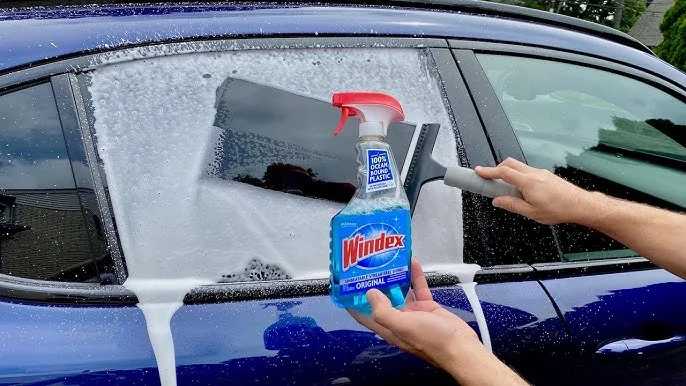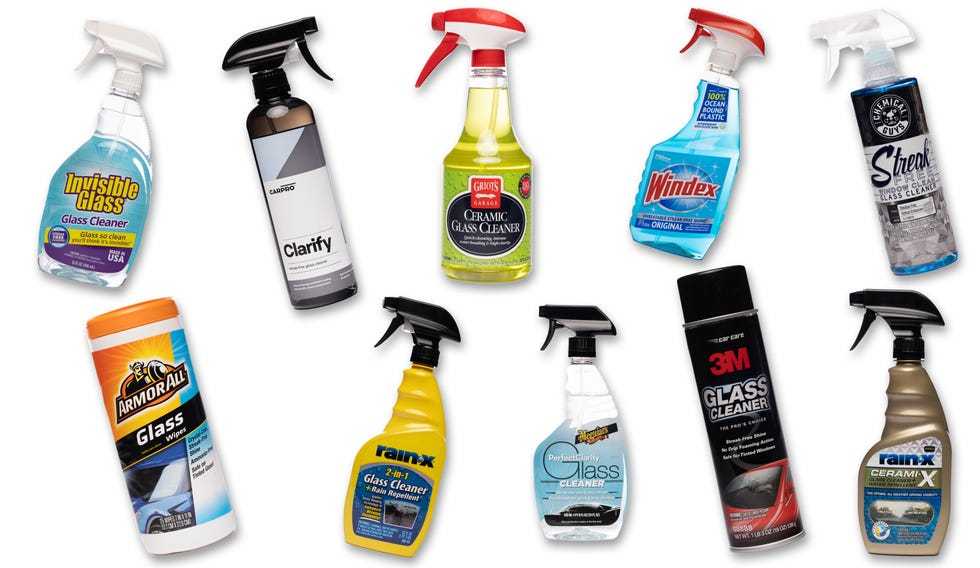For a sparkling, streak-free car glass, Windex often comes to mind, but specialized car glass cleaners can also do wonders. The quick answer? Windex is great for everyday cleaning and quick touch-ups, but a dedicated car glass cleaner is better for tougher grime and achieving a crystal-clear finish without streaks.
When it comes to keeping your car windows spotless, choosing between a general glass cleaner like Windex and a specialized car glass cleaner can be confusing. Windex is widely available and effective for regular use, but it might not always handle stubborn dirt or grime as well as a product made especially for automotive glass. Car glass cleaners are formulated to cut through road grime, bugs, and stubborn residues without leaving streaks or film, making them the top choice for car enthusiasts and daily drivers alike. Understanding the differences can help you decide which product best suits your cleaning needs, ensuring your windows stay perfectly clear and safe on the road.
Car Glass Cleaner vs Windex: Which Is the Best for Your Vehicle?
Introduction to Car Glass Cleaning
Keeping your car’s glass clean is essential for safety and appearance. Both car glass cleaners and Windex are popular choices for this task. But understanding their differences can help you choose the right product for your needs.
What Are Car Glass Cleaners?
Car glass cleaners are specially formulated products designed to clean automotive glass surfaces. They remove dirt, bugs, fingerprints, and other stubborn stains effectively. These cleaners are built to handle the unique qualities of automotive glass.
Features of Car Glass Cleaners
- Designed for automotive use
- Formulated to prevent streaks and smudges
- Often contain water-repelling agents
- Can be used on both interior and exterior glass surfaces
What Is Windex?
Windex is a well-known brand of multi-purpose glass cleaner. It is commonly used in households to clean windows, mirrors, and glass surfaces. Its widespread popularity makes it a go-to choice for many consumers.
Features of Windex
- Effective in removing grease, grime, and fingerprints
- Contains ammonia for powerful cleaning
- Leaves a streak-free shine
- Suitable for indoor glass surfaces
Comparison Table: Car Glass Cleaner vs Windex
| Feature | Car Glass Cleaner | Windex |
|---|---|---|
| Designed For | Automotive glass | Household glass surfaces |
| Special Ingredients | Water-repelling agents | Ammonia-based formula |
| Application | Interior and exterior car glass | Indoor windows and mirrors |
| Streak-Free Finish | Yes | Yes |
| Environmental Concerns | Some contain eco-friendly ingredients | Contains ammonia, which can be harsh |
How Effective Are Car Glass Cleaners?
Car glass cleaners are optimized to remove dirt that sticks to automotive glass. They are effective against bugs, mud splashes, and fingerprints on both the inside and outside of the windshield. Many products also include water-repelling properties to improve visibility during rain.
Pros of Using Car Glass Cleaners
- Designed specifically for vehicle glass
- Prevent streaks better than household cleaners
- Enhanced water-beading effects improve driving safety
How Effective Is Windex for Cleaning Car Glass?
Windex can clean car glass effectively for light dirt and fingerprints. However, it may not always handle stubborn grime as well as dedicated car products. Its ammonia content can sometimes leave streaks if not applied carefully.
Pros of Using Windex on Cars
- Quick and convenient for light cleaning
- Widely available and affordable
- Leaves glass shiny and streak-free
Limitations of Windex for Automotive Use
While Windex works well indoors, it can have drawbacks for outdoor vehicle cleaning. The ammonia can sometimes cause the rubber seals to degrade over time. Also, Windex may lack water-repelling properties needed for high-speed driving.
Best Practices for Cleaning Car Glass
Proper cleaning techniques ensure the best results regardless of product used. Always wash your vehicle in a shaded area to prevent quick evaporation and streaks.
Steps for Effective Cleaning
- Remove loose dirt and debris with water or a soft brush
- Spray the cleaner evenly on the glass surface
- Use a microfiber cloth or dedicated glass cleaning towel
- Wipe in circular motions to lift dirt and avoid streaks
- Dry thoroughly with a clean, dry cloth for a clear finish
Choosing the Right Product
Select a product based on your cleaning needs. For regular car maintenance, a dedicated car glass cleaner is typically more effective. For quick touch-ups, Windex can serve as a good interim solution.
Factors to Consider
- Type of dirt and stains
- Frequency of cleaning
- Environmental concerns and safety
- Water-repelling or anti-fog features
Related Topics
Maintaining Water Repellency on Car Glass
Applying rain-repellent products after cleaning helps improve visibility during storms. Products like Rain-X can be used in conjunction with glass cleaners for better results.
Cleaning Interior Car Windows
Interior cleaning requires gentle products that do not leave residues that could impair visibility. Windex and specialized interior glass cleaners work well for this purpose.
Removing Hard Water Stains and Mineral Deposits
In cases of hard water stains, special mineral deposit removers may be necessary. These products help restore clarity and prevent future buildup.
Choosing between car glass cleaner and Windex depends on your specific needs and the type of dirt on your vehicle. Dedicated car glass cleaners tend to offer better protection and water-repelling benefits, making them ideal for regular car maintenance. Windex, meanwhile, provides quick, effective cleaning for light dirt and indoor use, but it may not be the best option for heavy grime or outdoor conditions. Whichever product you select, proper cleaning techniques will help you achieve a streak-free shine and safer driving visibility.
Windex Vs. Sprayway Glass Cleaner
Frequently Asked Questions
How do car glass cleaners compare to Windex in terms of cleaning effectiveness?
Car glass cleaners are formulated specifically to remove dirt, grime, and streaks from automotive glass without leaving residue. Windex, while effective for household glass, may contain ingredients that are not optimized for car surfaces. Users typically find that dedicated car glass cleaners provide a clearer, streak-free finish that lasts longer, especially in outdoor conditions.
Are there any differences in the ingredients used in car glass cleaners versus Windex?
Yes, car glass cleaners often use ingredients designed to suit automotive glass, such as special surfactants and anti-fog agents that resist dirt buildup. Windex contains ammonia and other chemicals suited for household glass, which might be harsher or less effective on car surfaces. Choosing the right product helps preserve the integrity of your vehicle’s glass while cleaning effectively.
Can using Windex damage car glass or tinting over time?
Regular use of Windex on car glass can potentially harm tinted windows or certain coatings if it contains ammonia. Over time, this may cause fading or deterioration of the tint. Using a cleaner specifically made for automotive glass minimizes this risk and ensures the longevity of your window treatments.
Which product is more convenient for quick cleaning of car windows?
Car glass cleaners are designed for easy application in automotive settings, often coming in spray bottles with quick-drying formulas. Windex is widely available and convenient for household use, but for quick touch-ups on your vehicle, dedicated car glass cleaners tend to be more effective and less likely to leave streaks or residues.
Do car glass cleaners and Windex differ in price and availability?
Generally, both products are affordable and easy to find. Car glass cleaners might cost slightly more due to their specialized formulations, but they are readily available at auto stores. Windex is widely available at supermarkets and convenience stores, making it a cost-effective option for basic glass cleaning needs, though it may not always deliver the same results on automotive surfaces.
Final Thoughts
Car glass cleaner and Windex serve as popular options for maintaining clear windows. Car glass cleaners are specially formulated for vehicle surfaces, offering quick, streak-free results. Windex, primarily designed for household glass, provides versatile applications but may not suit car windows as effectively. Both products clean effectively, yet choosing the right one depends on your needs.
In conclusion, understanding the differences between car glass cleaner vs Windex helps you pick the best product. Car glass cleaner caters specifically to automotive glass, ensuring better safety and clarity. Windex works well for household use but might not give optimal results on vehicle glass.



